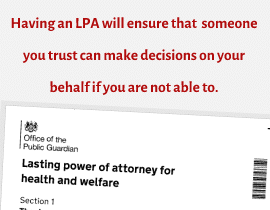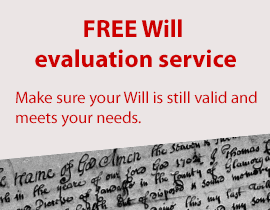Frequently asked Questions on Wills and Estate Planning.
We are always happy to answer any questions you may have about Wills or other estate planning services either face to face or on the phone, but for your convenience, we have compiled below the most frequently asked questions and our answers regarding Wills and estate planning.
Take a look, and if your question is not answered please don’t hesitate to get in touch and ask us.
Why do I need a Will? .. or what happens if I die without a Will?
I don’t have anything of value – do I really need a Will?
How much of a hassle is it to get a Will?
Can I write my own Will or should I use an estate planner or Will writer?
What is a beneficiary of a Will?
What is an executor of a Will and what do they do?
What tax will my family have to pay and how can I get around it?
What is a Lasting Power of Attorney (LPAs)?
Do Wills include Power of Attorney? Can I make decisions for someone if I am named in their Will?
What is a Trust, and do I need one?
What happens to my Will after I’ve made it?
What is probate and who looks after it?
What is a Will?
Quite simply a Will is a legal document that tells people how you want your assets – your property, your money and possessions to be dealt with after you die. It allows you to make the decision and to give to the people or organisations that you want to. Take a look at our Will writing service here.
Who can / should make a Will?
Obviously, we will say that all adults (those over 18) should make a Will, no matter the size of your estate. If you die without a Will it makes a tough time for your loved ones even harder having a longer wait, possibly costing them money and even not receiving what they should. (more on this below)
You should be made aware, the person making the Will needs to have the mental capacity to do so. We always advise our clients to take action on their planning when they can in order to not leave it too late.
Why do I need a Will? .. or what happens if I die without a Will?
Without a Will, your estate may not be distributed in the way you would like it to. Even if your preferred beneficiaries do end up with their inheritances – it is likely that it will have taken a lot longer, possibly been expensive, and certainly caused a lot more work and hassle for them compared to if you had written a Will.
If you die without a Will, it is called being “intestate”. Your estate will be handed out under the rules of Intestacy, which can be found here
If for example, you want someone who is not a direct descendent, a blood relative, or you are not married to or have a civil partnership with then it is very unlikely that they will receive anything. That means there is a very real scenario of a wanted beneficiary, even if you are living with them as partners but you are not legally married to or in a civil partnership with is likely to receive nothing. There is no such thing as common-law partners when it comes to inheritance.
For a full rundown on why you should have a Will, take a look here.
I don’t have anything of value – do I really need a Will?
If you don’t own a house or have any savings… then what’s the point in having a Will? Well, each of us has our own circumstances, but most people own something that they would want to specifically leave to someone – it could be a watch or your cat!, who will get your car? There is also the distinct possibility that just round the corner you may get the keys to your first house, you could get a promotion at work, the value of your pension or life insurance might increase, all factors that you should think about who you would like to benefit from in the future.
How much of a hassle is it to get a Will?
Depending on what your requirements are and how you get your Will done, it’s really not that difficult to do and it will not break the bank (especially if you consider what your loved ones might miss out on if you do not have a Will in place)
Using a service such as ours, the estate planner will take you through each step of the process, to make it as easy as possible, the main areas you need to think about are:
Making a list of your assets, such as; if you have one – how much is your house worth, what savings and any other financial assets you might have. Think about your possessions and what you want to do with them. Have a clear idea about who and how you want them to benefit from your estate. Also, it is important to think about the concerns that you may have with passing on your estate; are there potential beneficiaries who may not be able to cope with their inheritance? Is there someone you specifically don’t want to inherit? Whatever your concern, most Will writers will have seen similar scenarios and will be able to offer you solutions to put your mind at rest.
The estate planner will listen to your requirements and then come up with recommendations on how to meet them. If you are happy with that, then the Will will be drawn up and ready for you to sign.
Can I write my own Will or should I use an estate planner or Will writer?
You can write your own Will, you may download a pack from the internet, or grab one from Amazon.. but as with most things in life, doing it yourself can have negatives and lead to longer-term pitfalls if mistakes or omissions are made. A professional estate planner and Will writer can ensure that your Will is both robust and valid offering you peace of mind.
What is an estate?
“Estate” is used to describe the possessions and assets that you own. You might have a million-pound house, a swanky car, or simply some chattels that you want to pass on. Whatever you own, that is your estate. Find out more about what an estate is here.
What is estate planning?
Estate planning is simply the process of putting into action plans for how your estate is managed, either while you are living and/or after you die.
What is a beneficiary of a Will?
A beneficiary is someone that you want to leave something to in your Will, they will “benefit” from it.
What is an executor of a Will and what do they do?
The executor/s of a Will are the people who will manage your wishes as laid out in your Will, they will also handle the legal side of dealing with it, such as probate. It is normal to appoint someone you trust and who is capable of managing the process. We also routinely recommend that a professional executor or executor service is appointed to assist as or if required as it can be quite an onerous task. Find out about the Templar Estate professional executor service here.
What is a witness of a Will?
For a Will to be valid, it is required that you have two people over the age of 18, who are of sound mind and not going to benefit from the Will witness your signing of the Will.
They can be anyone from a friend to neighbours – they don’t have to be “professional” people. Their role is to ensure that you have signed the Will of your own free will and that you understand what you are doing and are not in any way being coerced into doing so.
To reassure you, there is no need or reason for them to actually read your Will.
To be clear, an intended beneficiary of your Will cannot be a witness, if they are then they will be discounted as a beneficiary.
Can I change my Will?
Yes of course you can change your Will, as long as you are of sound mind you can do so as many times as you like. In fact, we actively encourage people to ensure that their Will is up to date and continues to be robust after every big change in life or after a number of years.
Changes in life are a good point at which to do this; you might be getting married, or even have separated (but not divorced) from a partner. If you have a child you should through your Will stipulate and ensure that they have a guardian should the worse happen. Then as your child grows up and matures your thoughts on how you want them to benefit will likely change.
We offer a free Will evaluation service where we can offer advice on your new circumstances and ensure that your Will and other planning are still meet your requirements. Full details on this service here.
What tax will my family have to pay and how can I get around it?
The amount of tax your family will have to pay on your estate is dependent on how big your estate is and to a certain extent, the amount of estate planning that you have set up.
For smaller estates, no tax will need to be paid, but if you are over a certain threshold then there is the possibility of 40% tax on all assets over the threshold amount. With property prices the way they are at the moment, most of our clients meet this threshold and have concerns that their homes will need to be sold by beneficiaries to be able to meet tax demands if no other assets are available to pay for it.
There are certain methods to enable you to minimise the amount of tax you need to pay and any decent estate planner will be able to instruct you on those steps.
What is a Lasting Power of Attorney (LPAs)?
A Lasting Power of Attorney is a legal document that allows an individual to appoint a person of their choice to look after their affairs should they at a later stage need assistance or lack the capacity to manage their affairs themselves. This can be particularly relevant in cases such as dementia or even just being out of circulation for a time due to illness or hospital stays. A word of warning, LPA’s can only be set up for someone if they are sound of mind, in other words, have the mental capacity to understand what they are doing. It is very important to get this done quickly and at the time you still can. For more information on Lasting Power of Attorney, take a look here.
Do Wills include Power of Attorney? Can I make decisions for someone if I am named in their Will?
A Will and a Lasting Power of Attorney, although often produced at the same time, are different. There is nothing in a Will that will give you or someone else the legal right to make decisions for someone else if they are not able to do so themselves.
What is a Trust, and do I need one?
A Trust is a legal entity that forms a protective “wrapper” around your assets and can be of great value to anyone who wants to have more control and flexibility over how their assets are managed on death or during their lifetime. They allow a greater level of protection for your assets, and a loved one over a straightforward Will. Find out how they can help protect your estate here.
What happens to my Will after I’ve made it?
It is very important that you keep your original signed Will safe. It is your choice where and how you keep it, either at home or in some other safe environment. Here at Templar Estate Planning, we offer a storage solution for a small yearly fee.
It is also a good idea to let your executors and even your beneficiaries know where your Will is stored should they need to access it.
What is probate and who looks after it?
Probate is the legal and financial process involved in dealing with the estate of a person who has died. Usually, before your estate can be distributed, the person dealing with it – normally your Executor, has to apply for Probate. Templar Estate Planning offers a professional probate service, details of which are here.
Do you have any questions not answered above? We will be more than happy to answer them, contact us here.




